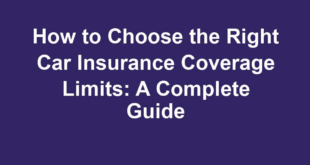Whether you’re looking to save some money on your auto insurance premiums or just want to better understand the basics of car insurance, understanding no-fault car insurance is an important step. No-fault car insurance is a type of auto insurance that is designed to reduce the amount of disputes over fault when an accident occurs. In this article, we’ll take a closer look at what no-fault car insurance is and how it works.
1. An Introduction to No-Fault Car Insurance
No-Fault Car Insurance was created to give drivers an option when traditional auto insurance left them without coverage. It covers medical expenses, property damage, and lost wages in the event of an accident, regardless of who is at fault. This form of insurance also offers more flexibility in terms of customization than traditional policies.
- Medical Expenses Coverage: With no-fault car insurance, medical expenses related to an accident are covered, regardless of who is at fault. This can help alleviate the financial burden for injury victims who lack health insurance.
- Property Damage Coverage: It also covers damages to personal property in the vehicle, such as laptops and other personal items.
- Lost Wages Compensation:When an accident results in temporary disability, no-fault car insurance can help compensate for missed wages.
- Flexible Policies: Depending on the plan and provider, no-fault insurance policies can be tailored to customers’ needs, so it can be worth considering for those shopping for an auto insurance policy.
Overall, no-fault car insurance provides coverage for medical expenses, property damage, and lost wages related to an accident, even if you are at fault. It can also offer more flexible policies than traditional car insurance, making it a desirable option for many drivers.
2. Understanding How No-Fault Car Insurance Works
No-fault car insurance can be a cost-effective way to get the coverage you need in an auto accident, but how does it work? is key to determining whether this type of coverage is a good fit for you.
No-Fault Coverage States: To begin, you should understand that no-fault insurance is a state-mandated system. In other words, no-fault insurance is a requirement in only certain states. To learn if your own state is a no-fault state, check out the Insurance Information Institute. If you live in a no-fault state, you must purchase a no-fault policy and meet certain requirements to be covered.
Your Own Insurance Covers You: Essentially, when you’re involved in an auto accident, your own insurance will cover you, regardless of who caused the accident. This means that you are protected from losing out on necessary expenses after an accident. But what about the other driver? No-fault insurance also limits their ability to sue you for damages. However, there are limits to no-fault coverage, such as:
- Medical bills
- Lost wages
- Funeral costs
- Pain and suffering
These are the primary items your policy will cover after an accident, which can be a benefit to you in the long run. Ultimately, having access to no-fault car insurance can be an invaluable asset after an accident. As long as you understand the limits, you should be prepared to manage the aftermath of an auto accident with minimal stress.
3. What Are the Benefits of No-Fault Car Insurance?
No-fault car insurance is a great option for drivers who are seeking additional coverage beyond the basics. This type of insurance is designed to pay for costs associated with repair to your vehicle and medical expenses, regardless of which driver is at fault for an accident. Here are the benefits of no-fault car insurance.
- 1. Coverage for Medical Expenses
- No-fault car insurance covers your medical expenses and those of your passengers in the event of an accident.
- It covers medical care right after an accident, as well as care in the weeks and months that follow.
- It helps policyholders avoid paying out of pocket for their medical bills.
- 2. Coverage for Damage to Your Vehicle
- This type of insurance may also cover repair and replacement of your vehicle in some cases.
- This can help you quickly restore your vehicle to top condition after an accident.
- It can also cover any property damage caused by the accident.
No-fault car insurance provides a valuable layer of protection that ensures you will have the financial resources you need in the event of an accident. Such benefits can help you stay on the road more safely and provide peace of mind for you and your family.
4. Sorting Out the Details of No-Fault Car Insurance
When it comes to , there are a few things that you need to keep in mind. It pays to know the basics of no-fault auto insurance coverage so that you can make the most of it:
- It doesn’t matter who was at fault in a car accident; your policy will cover the costs associated with medical expenses and a certain amount of lost wages
- Personal Injury Protection (PIP) benefits may be available for non-medical expenses, such as babysitting or services for a permanently disabled family member
- The exact details of PIP and other benefits will vary depending on where you bought the policy
When you are sorting out the details of your no-fault auto insurance coverage, it’s important to check the limits placed on your policy. Make sure you understand what your policy covers and what it doesn’t before you need to file a claim. That way, you will be better prepared to meet all of your obligations in the event of an accident.
No-fault car insurance is definitely the way to go if you’re looking for an insurance policy that helps to protect both you and the other drivers on the road. With the policy protecting you no matter who is responsible for the accident, you’ll never have to worry about being stuck with an unexpected bill. For drivers looking for financial peace of mind, no-fault car insurance is the ideal solution.





